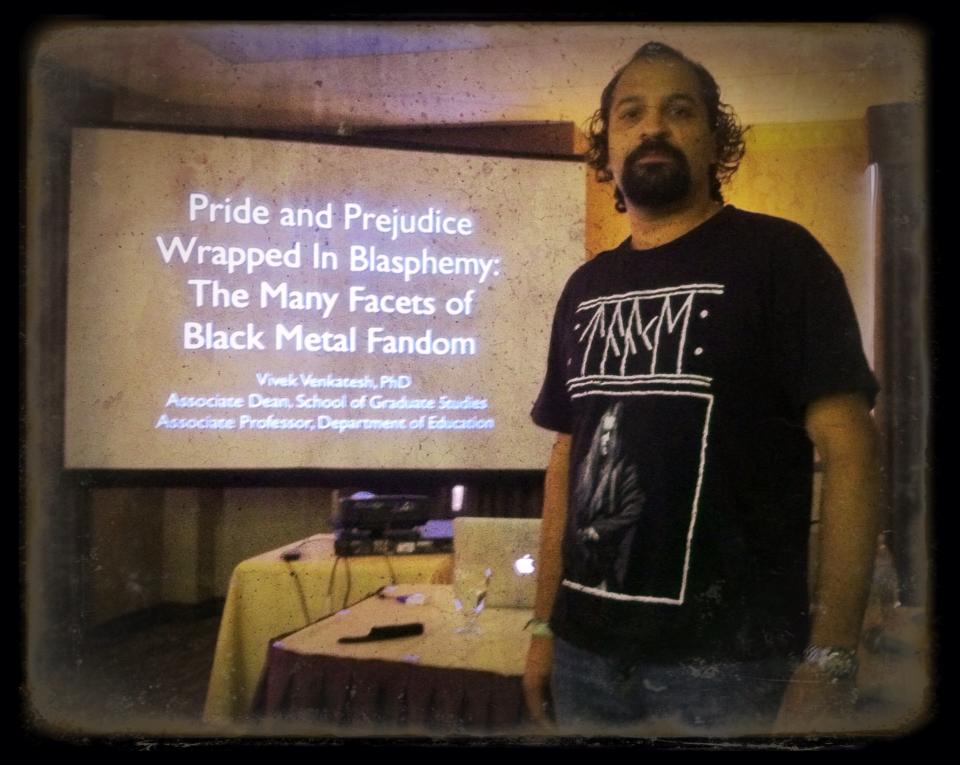Not long ago we introduced you to Concordia University professor/extreme music lifer Vivek Venkatesh. Today the man we affectionately call “Professor Death Metal” graciously gives us a sneak peak at “From Pride to Prejudice to Shame: Multiple Facets of the Black Metal Scene within and without Online Environments,” a chapter he co-authored with professor Jeff Podoshen, journalist David Perri and researcher Kathryn Urbaniak for a larger research collection entitled Educational, Psychological and Behavioral Consideration in Niche Online Communities.
The chapter, Venkatesh tells Decibel, “explores how black metal scene members manifest the tensions between their personal and communal identities, as well as how they negotiate the propagation of racism and xenophobia, both within and without online environments. Our chapter builds on sociological, psychological, and consumer culture-oriented research we have been conducting on the black metal scene. We draw on data from online forums, observations at several concerts and festivals in North America and Europe, interviews with black metal artists and fans, as well as personal, written reflections from Perri, an extreme metal music journalist who has struggled to find a balance between his appreciation of black metal music and some of the
overt racism and violence propagated in the scene.”
Here, for your edification, is an excerpt…
Our data point to converging physical and metaphysical conceptions of black metal amongst scene members, with commonalities including solitude, cold, forests, and obscurity. Overwhelmingly, the representation and propagation of the individual is of paramount importance to the black metal credo. Netnographic observations provide confirmation of the care with which fans point out how black metal relates to their character and personality. Forum members spoke of the spiritual aspects of listening to black metal, and deriving individual meaning from the music and lyrics, which, as explained in one entry, “… are difficult to put into words.” Posters and bloggers referred to the “elitist” nature of black metal; one such poster made constant mention of “elite members… of a black metal army.”
Interviewees also mentioned being reticent about discussing their conceptions of black metal with other black metal fans and referred to confrontations with other self-proclaimed black metal fans. Some interview participants, like Yasin (pseudonym), took black metal to task for being “a pretentious imagery of anger driven by despair.” Like many other interviewees and posters, Yasin pointed out that the affectations and theatrics of black metal have become too commonplace and contort the true meaning of black metal; Yasin also made reference to a distinct preference for enjoying black metal in solitude, as opposed to in groups. Our data also show that despite an allusion to a collective of black metal fans, black metal identities are intended to be discussed at the level of the individual, and only amongst a chosen, elite few. As co-author on this chapter, David Perri, who is a music writer specialising in extreme metal and a long-standing black metal fan, put it in an interview when asked about whether there were any absolute truths in black metal: “I guess the absolute truth is that not everybody gets this. I’m not being elitist, or [a] snob like ‘you don’t deserve to listen to this, there [are] only 10 people on this planet that should listen to this album,’ … it’s just [that] there might genuinely only be 10 people on this planet who get this… I don’t think the rest of the world understand this… so maybe that’s the absolute truth. It’s very few people who are actually going to get this… and that’s OK.”







